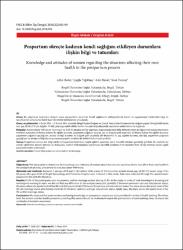Pospartum süreçte kadının kendi sağlığını etkileyen durumlara ilişkin bilgi ve tutumları.
Künye
Bulut A, Yigitbas C, Bulut Aziz, Tuncay S. [Knowledge and attitudes of women regarding the situations affecting their own health in the postpartum process]. FNG & Bilim Tıp Dergisi 2016;2(2):90-99. doi: 10.5606/fng.btd.2016.018Özet
Amaç: Bu çalışmada, kadınların doğum sonu (pospartum) sürecinde kendi sağlıklarını etkileyebilecek bakım ve uygulamalar hakkındaki bilgi ve tutumlarının ve bununla ilişkili bazı faktörlerin belirlenmesi amaçlandı.
Gereç ve yöntemler: 1 Ocak 2014 - 31 Aralık 2014 arasında Bingöl Kadın Doğum ve Çocuk Hastalıkları Hastanesinde doğum yapan 354 gönüllü kadın (ort. yaş 29.39±7.31 yıl; dağılım 17-68) çalışmaya dahil edildi. Veriler literatür doğrultusunda hazırlanan anket formu ile toplandı.
Bulgular: Katılımcıların %81.9’u ev hanımıydı ve %25.4’ü akraba evliliği yapmıştı. Araştırmada hem bilip bilmeme hem de öğrenmek isteyip/istememe kriterleri açısından; (i) Perine bakımı ile eğitim durumu, yaşamının çoğunun geçtiği yer ve doğum şekli arasında; (ii) Meme bakımı ile eğitim durumu, yaşamının çoğunun geçtiği yer, akraba evliliği durumu ve doğum şekli arasında; (iii) Beslenme ile yaş, eğitim durumu, aile tipi, yaşamının çoğunun geçtiği yer ve akraba evliliği durumu arasında yapılan analizlerde farklılık bulunmadı (p>0.05).
Sonuç: Pospartum sürece dair bilgi sahibi olmayan bazı kadınların sağlık eğitimi açısından daha öncelikli olmaları gerektiği görüldü. Bu nedenle bu yönde eğitimlere devam etmede ve dolayısıyla kadının farkındalığını sağlamada süreklilik yönünde hem kadınlar hem de bu hizmeti sunan sağlık personeli motive edilmelidir. Objectives: This study aims to determine the knowledge and attitudes of women about the care and practices which may affect their own health in the postpartum process, and several factors associated with these.
Materials and methods: Between 1 January 2014 and 31 December 2014, a total of 354 volunteer women (mean age 29.39±7.31 years; range 17 to 68 years) who gave birth at Bingöl Gynecology and Pediatrics Hospital were included in this study. Data were collected through the questionnaire prepared in line with the literature.
Results: 81.9% of the participants were housewives, and kin marriage existed among 25.4%. In the study, in terms of both knowing/not knowing and wanting/not wanting to learn, we did not find any difference in the analysis conducted (p>0.05); (i) Between perineum care and educational status, the place where she spent most of her life and delivery method; (ii) Between breast care and educational status, the place where she spent most of her life, kin marriage status and delivery method; (iii) Between nutrition and age, educational status, family type, the place where she spent most of her life and kin marriage status.
Conclusion: We observed that some women not having knowledge on postpartum process are to be prioritized in terms of health training. Therefore, both the women and the health personnel providing this service should be motivated towards the permanence of such trainings thus, to ensure the continuity of women’s awareness.


















